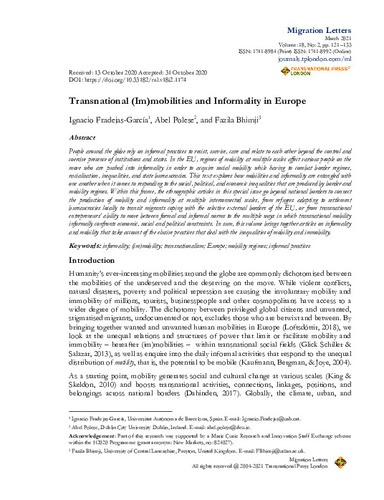Transnational (Im)mobilities and Informality in Europe
Autor(es) y otros:
Palabra(s) clave:
informality
mobilities
regimes of mobility
migration
transnationalism
informal economy
informal practices
Fecha de publicación:
Editorial:
Transnational Press London
Versión del editor:
Citación:
Descripción física:
Resumen:
People around the globe rely on informal practices to resist, survive, care and relate to each other beyond the control and coercive presence of institutions and states. In the EU, regimes of mobility at multiple scales affect various people on the move who are pushed into informality in order to acquire social mobility while having to combat border regimes, racialisation, inequalities, and state bureaucracies. This text explores how mobilities and informality are entangled with one another when it comes to responding to the social, political, and economic inequalities that are produced by border and mobility regimes. Within this frame, the ethnographic articles in this special issue go beyond national borders to connect the production of mobility and informality at multiple interconnected scales, from refugees adapting to settlement bureaucracies locally to transit migrants coping with the selective external borders of the EU, or from transnational entrepreneurs’ ability to move between formal and informal norms to the multiple ways in which transnational mobility informally confronts economic, social and political constraints. In sum, this volume brings together articles on informality and mobility that take account of the elusive practices that deal with the inequalities of mobility and immobility.
People around the globe rely on informal practices to resist, survive, care and relate to each other beyond the control and coercive presence of institutions and states. In the EU, regimes of mobility at multiple scales affect various people on the move who are pushed into informality in order to acquire social mobility while having to combat border regimes, racialisation, inequalities, and state bureaucracies. This text explores how mobilities and informality are entangled with one another when it comes to responding to the social, political, and economic inequalities that are produced by border and mobility regimes. Within this frame, the ethnographic articles in this special issue go beyond national borders to connect the production of mobility and informality at multiple interconnected scales, from refugees adapting to settlement bureaucracies locally to transit migrants coping with the selective external borders of the EU, or from transnational entrepreneurs’ ability to move between formal and informal norms to the multiple ways in which transnational mobility informally confronts economic, social and political constraints. In sum, this volume brings together articles on informality and mobility that take account of the elusive practices that deal with the inequalities of mobility and immobility.
ISSN:
Patrocinado por:
Ignacio Fradejas-García was supported by an FPI grant (BES-2016-076859), which is co-funded by the European Social Fund and the Ministry of Economy and Competitiveness of Spain, and by the ORBITS project, funded by the Ministry of Economy and Competitiveness of Spain (MINECO-FEDER: CSO2015-68687-P, 2016-2020). Abel Polese was supported by a Marie Curie Research and Innovation Staff Exchange scheme within the H2020 Programme (grant acronym: New Markets, no. 824027).
Colecciones
Ficheros en el ítem



